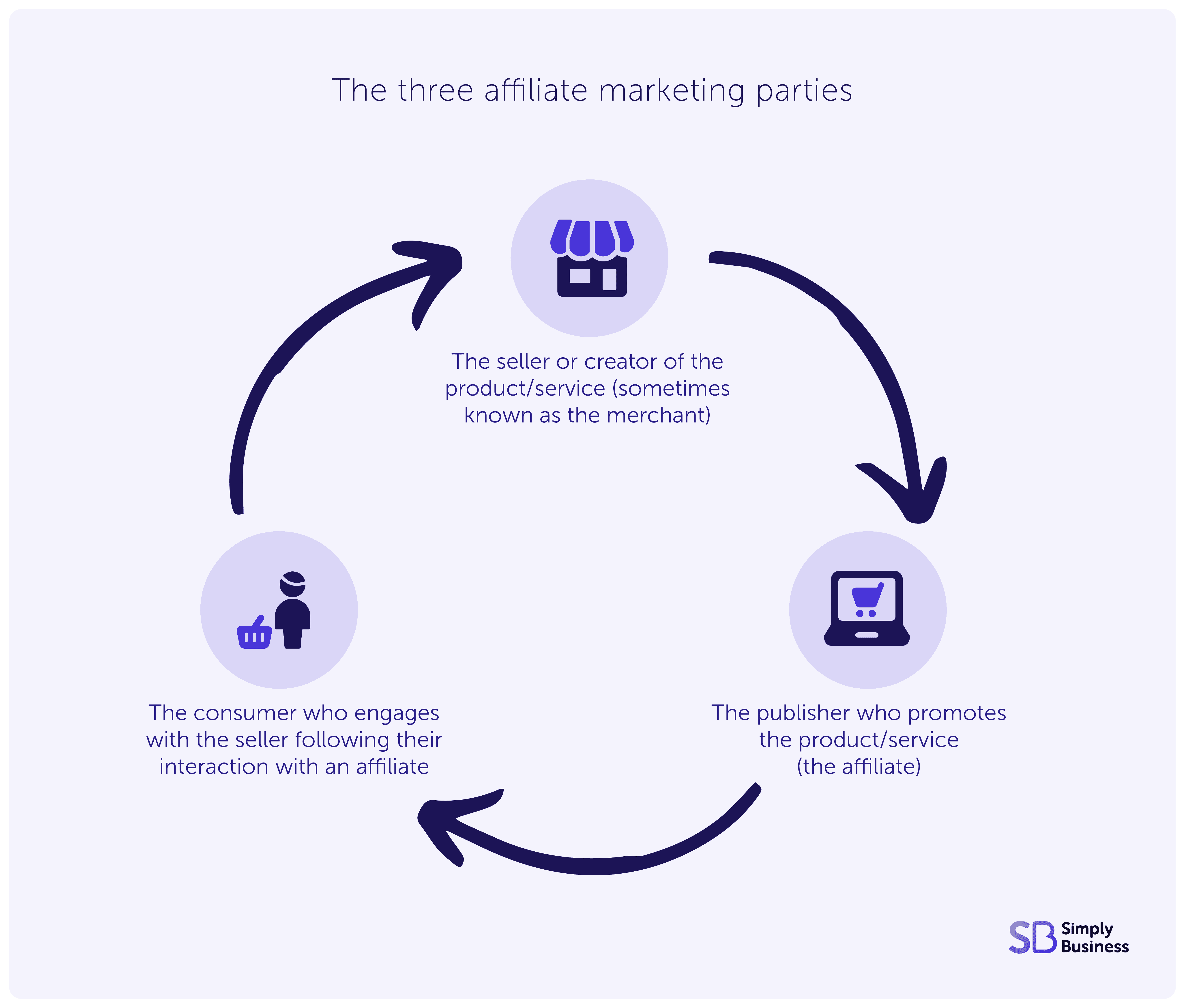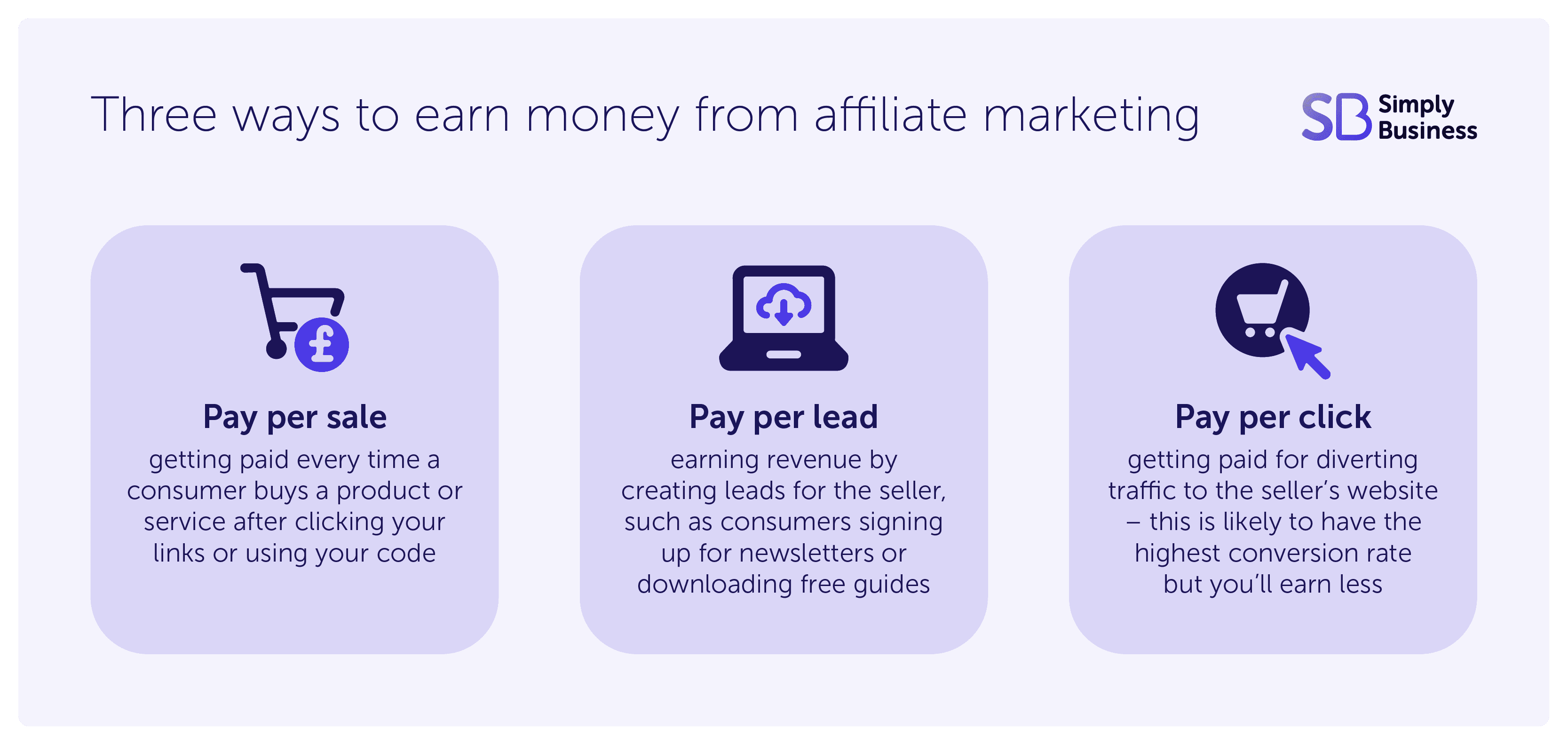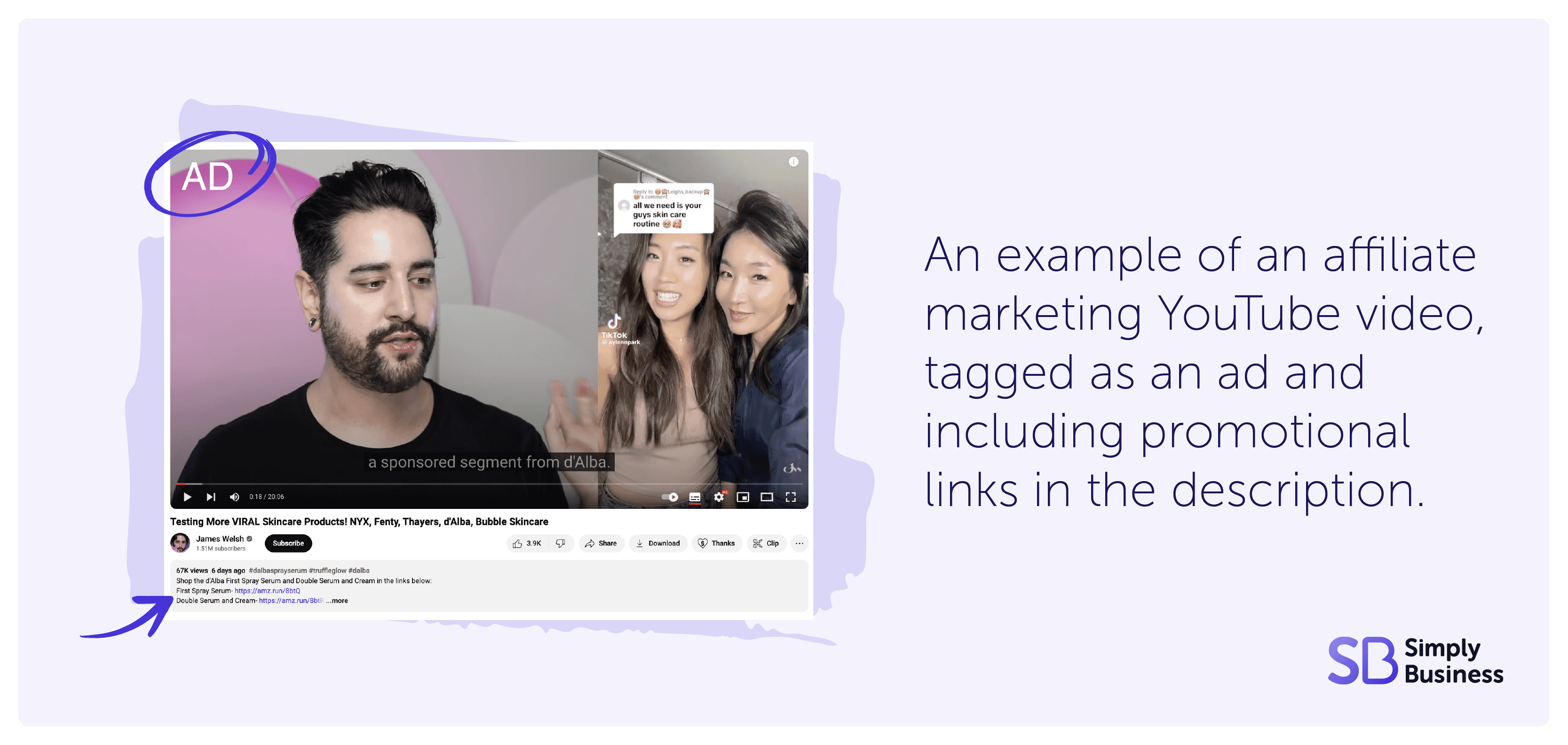How to start affiliate marketing – the complete guide
7-minute read

Affiliate marketing is a popular way to make extra money, and you don’t need to be a world famous influencer to do so.
For many people, the appeal of affiliate marketing is that you can make money without having a product or service. With the right approach and over time, affiliate marketing has unlimited earning potential as a passive income stream.
Read on to find out more about the steps affiliate marketers need to take to be successful.
In this article, we cover:
What is affiliate marketing?
Affiliate marketing is a way of earning money by promoting a company’s products or services through your own platform, such as a social media account or blog.
It’s a passive income stream, whereby you can earn a commission fee every time you drive an activity, such as a sale or click, for the company you’re promoting.
Affiliate marketing sales are usually tracked by affiliate links or special discount codes.
The pros and cons of affiliate marketing
As with all passive income streams, affiliate marketing has its advantages and disadvantages. Here are some of the things you’ll need to consider before getting started:
Affiliate marketing benefits
- low cost – you can start affiliate marketing with no money and it doesn’t take long to get set up
- low maintenance – as you’ll be promoting other companies’ products, you won’t need to think about things like customer service, fulfilment, or complaints
- unlimited earning potential – if you’re a successful affiliate marketer, there’s no reason why you can’t scale your business quickly
Affiliate marketing downsides
- it takes time – to start earning a significant amount from affiliate marketing, you’ll need to build trust with your audience and work out the best approach to drive clicks or sales
- earnings are based on performance – if your links aren’t driving any engagement for brands, then you won’t be making any money
- you have to rely on brand offers – if brands take away the best deals for your audience, it can be difficult to get engagement with your affiliate content
How does affiliate marketing work?
Affiliate marketing helps companies promote their products and services to a wider audience through the online audiences of partners and influencers.
There are three main parties involved in affiliate marketing:
- The seller or creator of the product/service (sometimes known as the merchant)
- The publisher who promotes the product/service (the affiliate)
- The consumer who engages with the seller following their interaction with an affiliate

For example, you’ve created a successful blog and YouTube channel which focuses on book reviews. You want to start monetising your content as an affiliate so you get in contact with a national bookstore (the publisher/merchant).
The bookstore agrees to pay you a commission fee of four per cent every time someone (the consumer) clicks on an affiliate link from one of your articles or videos and buys a book from the retailer’s website.
If you promote products through affiliate marketing, there are three ways you can earn revenue:
- Pay per sale – getting paid every time a consumer buys a product or service after clicking your links or using your code
- Pay per lead – earning revenue by creating leads for the seller, such as consumers signing up for newsletters or downloading free guides
- Pay per click – getting paid for diverting traffic to the seller’s website
As an affiliate, you’ll usually get paid once you generate a certain number of sales, leads, or clicks.

Affiliate marketing: unattached vs related vs involved
There are three types of affiliate marketing that require different effort levels that are likely to generate a range of results.
1. Unattached affiliate marketing
For this, you won’t need any experience of the brand or product. These campaigns are more likely to be pay-per-click, which means less effort on the creator’s part but less chance of success.
2. Related affiliate marketing
In this scenario, the marketer has more of a link to the brand or product they’re promoting. For example, someone with a culinary blog could be promoting a new baking tin. This is a good route for marketers who have chosen a niche to operate in.
3. Involved affiliate marketing
As the name suggests, this type of affiliate marketing requires the creator to have a direct link to what they’re promoting. Usually this means having used the product or service themselves, so they can give a genuine review or recommendation.
Audiences are more likely to trust this kind of content, so it can drive more sales but requires more effort and thought.
How to start affiliate marketing
Affiliate marketing is a popular way of earning passive income and it often starts as a side hustle. However, that’s not to say being an affiliate marketer can’t be a full-time job.
Firstly, you’ll need to decide how you’re going to promote products and services. You could do it via your YouTube channel, social media platforms like Pinterest, blogs, email newsletters, or a combination of them all.
Read more: How to advertise your business – the ultimate marketing guide
Next, you’ll need to find the products to promote to your audience. You could target individual companies or join an affiliate network.
An affiliate network matches marketers with products to promote. They allow affiliate marketers to sign up to advertising campaigns from a range of different companies.
If you choose to work with a network, make sure you’re happy with how it works and the commission on offer. Once you’ve signed up and been accepted to the network, you can add links and codes to your content to start generating revenue.

Affiliate marketing for beginners
Affiliate marketing is popular because you can get started quickly, work to your own schedule, and don’t have to get involved in things like customer service.
If you’re thinking about becoming an affiliate marketer, here are some key questions you should be asking yourself:
- do you have a big enough audience to earn money?
- do you have the influence to encourage people to buy products?
- what type of products should you be promoting?
- how are you going to promote the products?
How to find affiliate programmes to join
Once you’ve decided on your platforms for promoting content, plus your niche and whether your audience will be business to business or business to consumer, you could start looking for affiliate programmes (also known as networks) to join.
When choosing the best programmes to join, one of the main things to consider is whether you’re planning to do unattached, related, or involved affiliate marketing.
You can search for affiliate networks online – some of the best-known include Amazon, eBay, and Rakuten. These programmes allow you to promote products from these platforms for commission fees of up to 10 per cent.
Niche networks could offer higher commission fees and be less competitive.

How to make money from affiliate marketing
Affiliate marketing is performance-based, meaning there’s no limit to what you could earn but you’ll only get out what you put in.
If you’re going to make money from affiliate marketing, optimisation is crucial. For example, when creating blogs or videos you’ll need to include the right keywords to make sure your content shows up in search engine results.
Meanwhile, if you’re using social media, you’ll need to use tags effectively and learn about how you can use each platform’s algorithm to get seen by more people.
At the same time, you’ll need to build trust with your audience. You can do this by creating genuinely helpful content, only promoting quality products or services, plus sharing your story and elements of your day-to-day life.
Read our guide to social media advertising costs if you're considering putting any money behind your posts.
Best channels for affiliate marketing in 2024
Here’s an overview of some of the most popular types of affiliate marketing and what you need to consider.
Making money from blogs
Blogging is a successful way of making passive income through affiliate marketing. You can build your own blog or buy existing ones and optimise them to attract more visitors.
As well as including affiliate links in your standard posts, you can also actively review products. If you get known for being an expert on a certain type of product, such as cycling equipment, brands may start coming to you for reviews in exchange for an affiliate link.
To be a successful blogger, you need to create engaging content that builds authority and trust with your audience.
Affiliate marketing on YouTube
To make money on YouTube through affiliate marketing, you’ll need to attract subscribers to your channel and encourage them to watch your videos.
You can include affiliate links and discount codes in your descriptions, while also referencing them in your videos.
Read our comprehensive guide to making money on YouTube to get started.
Becoming a social media influencer
It takes time to become an established influencer, and you’ll need to build a personal connection with your followers.
Your campaigns will mainly be focused on platforms like Instagram and TikTok, but many influencers also use YouTube videos and blogs to promote affiliate products. Read our guide to making money on TikTok for some top tips.
Influencer marketing campaigns are often developed around a niche, such as candle making or home baking.
These campaigns will usually include a combination of sponsored posts, including photos, videos, and livestreams.
Our guide to building a following on Instagram has more tips.
How to track progress of your affiliate marketing
There are a range of tools out there to track progress, from ThirstyAffiliates and Tapfiliate to Affilimate and Moonpull. You can also use Google Analytics to monitor activity on your links. The partners and affiliate networks you work with will also be able keep you up to date with results.
The things you’ll need to keep an eye on include:
- traffic (visits to your content)
- link clicks
- sales
- conversion rates
This will help you to see which links and approaches are working best and where you’re making your money. Remember to make sure that all your affiliate links are tagged properly, otherwise it will be difficult to track progress.
Read our complete guide to small business marketing for more information.
Affiliate marketing – the importance of being authentic
To be a successful affiliate marketer, you need to build trust with your audience. Alongside being transparent when you’re promoting products, it’s important to continue to post content that isn’t sponsored.
Your audience will be looking for genuine reviews and recommendations, so don’t promote things that you don’t think represent good value or you wouldn’t use yourself.
Sometimes you’ll need to turn down promotion opportunities if they’re not a good fit. This could help you to be more successful in the long run as you’ll avoid alienating your audience.
Advertising rules for affiliate marketers
If you become an affiliate marketer, you’ll need to follow the code set out by the Committee of Advertising Practice (CAP), which is regulated by the Advertising Standards Authority (ASA).
There’s a full overview of the rules on the ASA website, but here’s a brief summary of what you need to know:
- there’s a difference between editorial and affiliate content
- affiliate marketing content must be clearly labelled
- brands are also responsible if you break the rules
It’s important to remember that the ASA and CAP guidance isn’t legal advice and you should get help from a legal professional if you think you may be breaking the law with your advertising.
Do you have any unanswered questions about affiliate marketing? Let us know in the comments below.
More small business guides
Ready to set up your cover?
As one of the UK's biggest business insurance providers, we specialise in public liability insurance and protect more trades than anybody else. Why not take a look now and build a quick, tailored quote?
Start your quote
Written by
Conor Shilling
Conor Shilling is a Copywriter at Simply Business with over two years’ experience in the insurance industry. A trained journalist, Conor has worked as a professional writer for 10 years. His previous experience includes writing for several leading online property trade publications. Conor specialises in the buy-to-let market, landlords, and small business finance.
We create this content for general information purposes and it should not be taken as advice. Always take professional advice. Read our full disclaimer
Keep up to date with Simply Business. Subscribe to our monthly newsletter and follow us on social media.
Subscribe to our newsletterInsurance
Public liability insuranceBusiness insuranceProfessional indemnity insuranceEmployers’ liability insuranceLandlord insuranceTradesman insuranceSelf-employed insuranceRestaurant insuranceVan insuranceInsurersAbout
About usOur teamAwardsPress releasesPartners & affiliatesOur charitable workModern Slavery ActSection 172 statementSocial mediaSite mapAddress
6th Floor99 Gresham StreetLondonEC2V 7NG
Northampton 900900 Pavilion DriveNorthamptonNN4 7RG
© Copyright 2024 Simply Business. All Rights Reserved. Simply Business is a trading name of Xbridge Limited which is authorised and regulated by the Financial Conduct Authority (Financial Services Registration No: 313348). Xbridge Limited (No: 3967717) has its registered office at 6th Floor, 99 Gresham Street, London, EC2V 7NG.